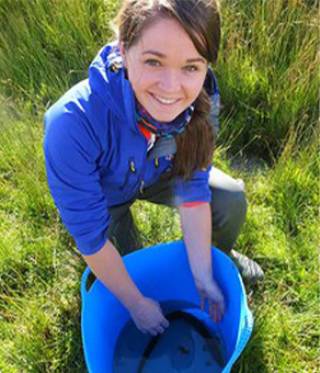Research Title
Inferring agricultural impacts on aquatic biodiversity in farmland ponds and ecological recovery following restoration
- More about Eleri
Academic Qualifications
- 2017 – Present, University College London: London NERC DTP PhD Candidate
- 2015 – 2016, University College London: MSc Conservation (Distinction): Dissertation: ‘Success of the Signals: Invasion biology and impacts of Pacifastacus leniusculus in a rocky headwater stream, North Yorkshire’.
- 2011 – 2014, University of Bath: BSc Biology (First Class Honours): Dissertation: ‘Ballistosporic yeast diversity of the phylloplane in Acer species and the effect of tar spot disease’.
Work Experience
- 2017 – Present: Publicity Secretary: London Freshwater Group
- March 2017 – September 2017: Field Ecologist: PBA Applied Ecology
- Teaching
I have been involved in the following teaching:
- March 2021: Undergraduate seminar on river restoration - Managing freshwater in the 21st century
- October 2020: MSc Scientific basis for freshwater and coastal conservation online lectures and debate seminar
- February 2020: Undergraduate seminar - Managing Freshwaters in the 21st Century
- September 2019: MSc Field class - Scientific basis for freshwater and coastal conservation
- September 2018: MSc Field class - Scientific basis for freshwater and coastal conservation
- Publications
- Pritchard, E. G., Chadwick, D. D. A., Chadwick, M. A., Bradley, P., Sayer, C. D., & Axmacher, J. C,. Assessing methods to improve benthic fish sampling in a stony, headwater stream. In Review.
- Pritchard, E. G., Chadwick, D. D. A., Patmore, I. R., Chadwick, M. A., Bradley, P., Sayer, C. D., & Axmacher, J. C. (2021). The ‘Pritchard Trap’: A novel quantitative survey method for crayfish. Ecol Solut Evidence, 2: e12070. https://doi.org/10.1002/2688-8319.12070
- Chadwick, D. D. A., Pritchard, E. G*., Bradley, P., Sayer, C. D., Chadwick, M.A., Eagle, L. J. B., Axmacher, J.C. (2021). A novel ‘triple drawdown’ method highlights deficiencies in invasive alien crayfish survey and control techniques. J. Appl.Ecol. 29. doi: 10.1111/1365-2664.13758 *Corresponding author
- Chadwick D. D. A, Eagle, L. J. B, Pritchard, E.G, Sayer, C.D, Chadwick, M. A, Axmacher, J.C, Bradley, P. (in press) Invasive signal crayfish in the UK: survey methods to inform evidence-based management. In Practice - Biosecurity and Invasive Species Special Edition, Chartered Institute of Ecology and Environmental Management (CIEEM)
Blogs/writing for a wider audience
- Pritchard, E.G, (2020) Invasive species: Why Britain can’t eat its way out of its crayfish problem, The Conversation.
Conferences
- October 2019, Canada: Oral Presentation at International Conference on Aquatic Invasive Species (ICAIS) - Invasions in the Anthropocene
- September 2019, London: Oral Presentation at A Dynamic Earth - The Joint DTP Conference (1st place judge's choice award, 3rd place people's choice award)
- September 2018, London: Poster Presentation at A changing Planet - The Joint DTP Conference (1st place people's choice award)
- September 2018, Ireland: Poster Presentation at Neobiota - 10th International Conference on Biological Invasions
Invited Talks
- July 2018: Presentation and field assistance on CIEEM “Working with Crayfish” Course.
- January 2018: Presentation at the Norfolk Crayfish Group Meeting, Holt.
- March 2017: Lecture at London Freshwater Group, Linnean Society of London.
- November 2016: Lecture at Institute of Fisheries Management (IFM), London.
- September 2016: Lecture for MSc Aquatic Science and Conservation Field Trip, UCL.
- August 2016: Lecture and Workshop for A-Level Biodiversity Summer School, UCL.
- June, 2016: Lecture for BSc Zoology Students, Malham Tarn Field Centre.
- Research Interests
The worldwide, human-induced spread of invasive alien species has had severe ecological, social and economic implications, with freshwater systems proving particularly vulnerable to invasion. Freshwater crayfish are exceptionally successful invaders, with 90% of species introduced to Europe becoming established in the wild. As ecosystem engineers, they present a significant threat to aquatic ecosystems.
This project aims to better understand the spatio-temporal ecological impact of invasive crayfish on native biota. Previous studies have produced inconclusive and conflicting results on these impacts. I hypothesise that, since traditional recording techniques fail to provide quantitative data on crayfish population densities and structure, they present a key limitation of contemporary studies. Developing novel sampling techniques that are more efficient and accurate than current methods, this project aims to provide insights into the population structure of invasive crayfish. These techniques will be used subsequently in a broader study to assess impact levels of invasive crayfish on fish and invertebrates.
- Impact
The results of this research can be used to inform policy, conservation and management decisions by improving our understanding of the ecological impacts of invasive crayfish. This is important for biodiversity conservation, but also in the management of recreational fisheries which are of huge economic importance.
Objectives
- Develop and test novel crayfish sampling techniques
- Investigate signal crayfish population structure and invasion biology
- Evaluate the density-dependent impacts of invasive crayfish on fish and invertebrates
 Close
Close


